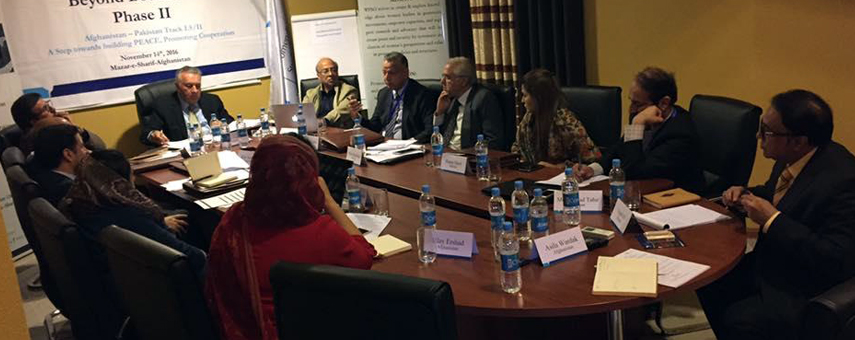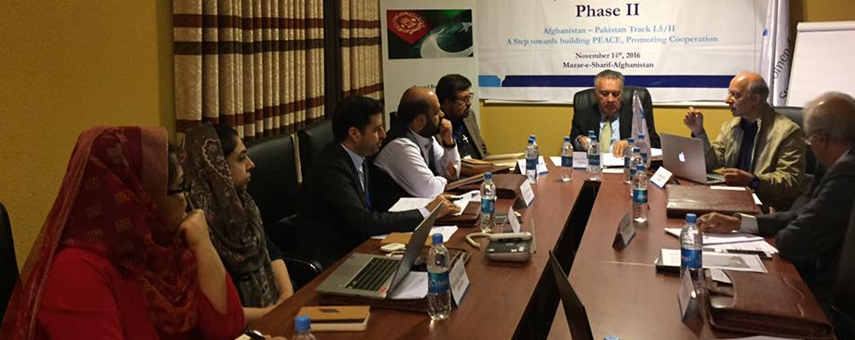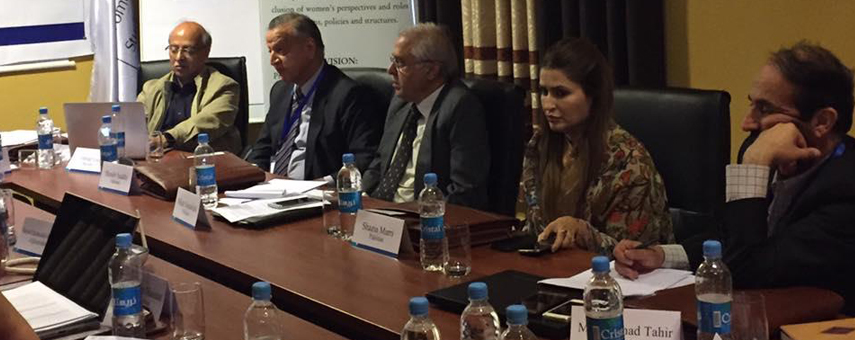The second meeting of the Beyond Boundaries Phase II groups of the Pakistan Afghanistan Joint Committee (PAJC) was held at Mazar-e-Sharif and Kabul, from 13 to 17 November, 2016.
A five member Pakistani delegation arrived in Kabul on Sunday 13 November, where the delegation visited the ongoing Pakistan funded projects for Afghan government in Kabul, namely Jinnah Hospital and Rehman Baba School and Hostel. The group met with the administration of both the projects, took stock of the progress and hurdles or delays in the implementation of these projects.
Both the groups travelled to Mazar-e-Sharif for a one day workshop/ dialogue on 14 November, and visits to Balkh University (a project funded by Pakistan and handed over to Afghanistan in 2011) and Mawlana University on 15 November for interaction and lectures/ presentations by selected two members from both the delegations; these university visits are part of the outreach to the youth of Afghanistan designed for the initiative to counter misperceptions about each other and improve their understanding on the Pak-Afghan bilateral relations (reports from university visits under separate tabs below).
During the one day workshop/ dialogue a the PAJC held detailed deliberations on the core issues affecting Pak-Afghan bilateral relations and devised ways and means to work together as civil society groups delinking themselves from the official positions of the two governments and the political deadlock between the two neighboring countries, but at the same time acting as a track II mechanism to lobby and influence the two governments for improvement in the bilateral relations.
The Pakistani delegation comprised Dr. Shoaib Suddle, former IG Police and federal tax ombudsman; Shazia Marri, Member of Parliament; Qazi Humayun, former ambassador; Mian Sanaullah, former ambassador; and Tahir Khan, senior journalist. The Afghanistan side included Khalid Pashtoon, Member of Parliament; Elay Ershad, Member of Parliament; Sayed Qutbudin Roydar, former deputy minister for parliamentary affairs; Mozammil Shinwari, former deputy minister for trade & commerce; Abdul Hakeem Mujahid, head of executive council of the High Peace Council; Palwasha Hassan, civil society leader; and Bilal Sarwary, senior journalist.
The core issues discussed in the meeting included peace and security, refugees, trade, education and scholarship programmes, Pakistan funded projects in Afghanistan, Media, Arts and Culture cooperation, movement of goods and people across the two countries, and liberalizing visa regimes.
The delegates renewed calls for both governments to take steps against cross-border movement of terrorists and stressed the need for rooting out terrorism in the interest of regional peace and stability. Recognizing the deterioration in relations between the two countries, they underscored the need for enhancing interactions in education, culture and sports. Discussing the refugees issue, focusing on the recent episode of Sharbat Gula’s deportation, both sides agreed upon the need for evolving a legal mechanism for benefiting vulnerable Afghan refugees. Both sides agreed to urge their respective governments to ensure repatriation of Afghan refugees with dignity and honor. On trade, both sides urged their respective governments to quickly review the Afghan Pakistan Transit Trade Agreement.
In the last session of the workshop, the PAJC reviewed the policy recommendations from the first meeting in Pakistan last month, and formulated policy recommendations from this meeting, which will be shared with the governments of Afghanistan and Pakistan, as well as other different official and civil society forums (policy recommendations tabulated under a separate tab below).
The PAJC groups travelled back to Kabul, where they held important stakeholder sideline meetings at the highest level of the Afghanistan government, which included meetings with the Chief Executive, H.E. Dr. Abdullah Abdullah; Minister of Refugee and Repatriation, S. Hossain Alemi Balkhi; and Deputy Foreign Minister, Dr. Nasir Ahmad Andisha (reported separately below under the tab of sideline meetings). The programme of the PAJC also included media interactions of selected delegates from both the groups at Mitra TV, Shamshad TV, and Tolo TV. While before departing for Kabul a TV talk Show was held at Mashriq TV as a curtain raiser for the visit.
The Beyond Boundaries Phase II project – PAJC groups – will have six meetings among five to seven members from Pakistan and Afghanistan comprising security experts, parliamentarians, retired civil and military senior bureaucrats, members of the civil society and business, and media representatives. The first two meetings have been held successfully as reported, while the remaining four meetings will take place from December 2016 through March 2017, two each in Afghanistan and Pakistan.









